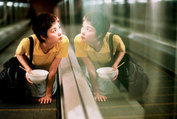Chung King Express

This 1994 WONG Kar-wai movie has a resonance with me. I know all the locations, having worked in Tsim Sha Tsui as a young inspector. The quirky characters and oddball people are also familiar. The movie captures the claustrophobic atmosphere and cheek by jowl life of the Chung King Mansions. A building I’ve spent many hours in dealing with various incidents.
Two stories unfold in the film, involving two police officers. Both are going through romantic breakups and dealing with it in their own way. Meanwhile, a drug deal is going down and a murder. These are incidental to the main themes, as characters in a crowded city lead a lonely existence. The cast is superb especially Faye Wong as the wacky cafe worker, who falls for Tony Leung’s patrol cop 663.
I suppose a subtext to the film is the approaching 1997 handover to Chinese rule. People were looking to move out of Hong Kong. Making a quick buck on a drug deal is one exit strategy. Faye Wong’s character escapes her boundaries taking off to see the world as an air-stewardess. Yet, in the final scene, she returns to the cafe to find cop 663 the new owner. You kinda hope these two settle down to a relationship, although that's uncertain.
Chris Doyle did an awesome job with the cinematography. The shots in the rain are his trademark. A catchy soundtrack compliments the mode and pace. What is surprising is the whole thing was filmed to fill time between other projects. Yet the result supplants other WONG Kar-wai films. I suppose the spontaneity is hard to recapture.
Two stories unfold in the film, involving two police officers. Both are going through romantic breakups and dealing with it in their own way. Meanwhile, a drug deal is going down and a murder. These are incidental to the main themes, as characters in a crowded city lead a lonely existence. The cast is superb especially Faye Wong as the wacky cafe worker, who falls for Tony Leung’s patrol cop 663.
I suppose a subtext to the film is the approaching 1997 handover to Chinese rule. People were looking to move out of Hong Kong. Making a quick buck on a drug deal is one exit strategy. Faye Wong’s character escapes her boundaries taking off to see the world as an air-stewardess. Yet, in the final scene, she returns to the cafe to find cop 663 the new owner. You kinda hope these two settle down to a relationship, although that's uncertain.
Chris Doyle did an awesome job with the cinematography. The shots in the rain are his trademark. A catchy soundtrack compliments the mode and pace. What is surprising is the whole thing was filmed to fill time between other projects. Yet the result supplants other WONG Kar-wai films. I suppose the spontaneity is hard to recapture.
Copyright © 2015